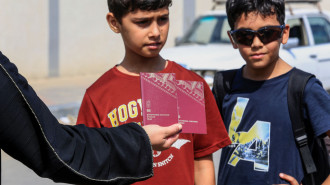UN voices 'deep concern' ongoing detention of Moroccan journalist Soulaimane Raissouni
The United Nations have concluded that Morocco's detention of opposition journalist Soulaimane Raissouni is "arbitrary" and called for his immediate release, reported AFP.
Raissouni was arrested in May 2020 after a young LGBTQ+ activist pressed charges against him, and became one of several journalists critical of Morocco's government to have been imprisoned for "sex crimes".
In February, the Casablanca court of appeal upheld a five years sentence against the journalist. Raissouni always maintained his innocence and says he is being prosecuted "because of his opinions".
The UN's Working Group on Arbitrary Detention concluded that "violations of the right to a fair trial were of such gravity that Mr Raissouni's detention is arbitrary".
The report also voiced "deep concern for his physical and psychological well-being", and said the "appropriate move would be to release him immediately".
After he was detained, the 49-year-old columnist staged a 122-day hunger strike, which has deeply affected his health, according to his family. A piece of information the Moroccan authorities have denied.
Raissouni's family also said that he was deprived of his writings and books. The journalist protested the measure by refusing to leave his cell for more than three months and counting.
#الحرية_لسليمان_الريسوني#أطلقوا_سراح_سليمان_الريسوني pic.twitter.com/oH5wlwO28a
— هاجر الريسوني hajar raissouni (@hajarraissounu) October 1, 2022
The journalist's arrest came two days after he published an editorial criticising the authorities for taking over-zealous measures during the coronavirus pandemic.
The UN experts concluded that the journalist's arrest was linked to his writings, saying Raissouni had been "detained for peacefully exercising that right".
Moroccan authorities insist his trial was fair and that the charges have nothing to do with his journalism.
Since 2019, two other Moroccan journalists, Omar Radi and Taoufik Bouachrine, have been sentenced to prison terms for sexual assault, accusations they have firmly denied.
Radi was also convicted of espionage.
Last year, the international NGO Forbidden Stories said that Radi, Raissouni, and other Moroccan journalists were targeted for surveillance using the Israeli Pegasus spyware.
Moroccan authorities denied using the spyware and sued Amnesty and Forbidden stories for 'defamation.'
Morocco stands at 136 out of 180 in the Paris-based watchdog Reporters Without Borders (RSF) world press freedom ranking of countries.




 Follow the Middle East's top stories in English at The New Arab on Google News
Follow the Middle East's top stories in English at The New Arab on Google News
![People gathered around the rubble of destroyed houses to search for survivors [Getty]](/sites/default/files/styles/image_330x185/public/2024-11/GettyImages-2184733820.jpg?h=199d8c1f&itok=NiM1LO2f)

